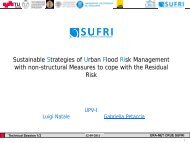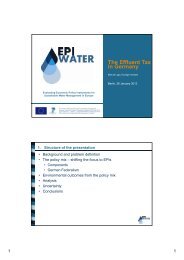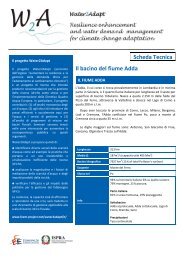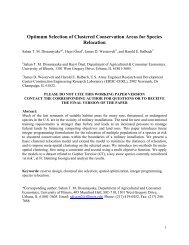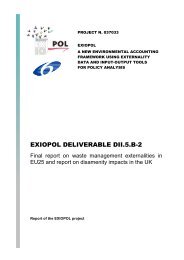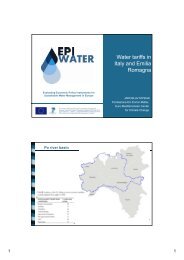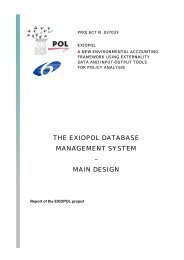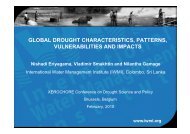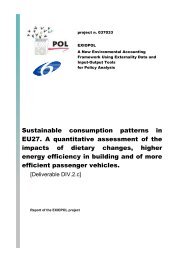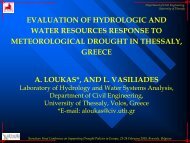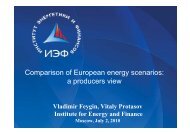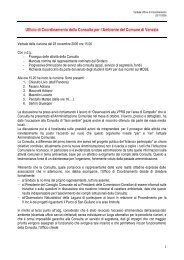Gulf and European Energy Supply Security - Feem-project.net
Gulf and European Energy Supply Security - Feem-project.net
Gulf and European Energy Supply Security - Feem-project.net
You also want an ePaper? Increase the reach of your titles
YUMPU automatically turns print PDFs into web optimized ePapers that Google loves.
<strong>Energy</strong> <strong>Security</strong>: Potential for EU-GCC Cooperation<br />
• in case of energy shocks, this restructuring will the uncertainties created. This case would provide<br />
allow Europe to be largely protected by lower a very challenging setting for the development<br />
energy dem<strong>and</strong>, higher contribution of domestic of cooperative relations between importer<br />
non-fossil fuels (renewable <strong>and</strong> nuclear) <strong>and</strong> a countries <strong>and</strong> their suppliers. New orientations<br />
much lower level of fossil fuel imports.<br />
may encompass economic collaboration on new<br />
Scenarios that involve no drastic change in low carbon technologies or reinforced economic<br />
Europe’s energy system imply the development cooperation in areas other than energy.<br />
of the energy security strategy in a conventional Scenarios with a new energy paradigm display<br />
setting: the main concern is to ensure that sufficient a lower dem<strong>and</strong> <strong>and</strong> higher share of non-fossil<br />
supply is available, particularly of oil <strong>and</strong> gas. The domestic sources, whether renewable or nuclear.<br />
<strong>Energy</strong> Charter that currently provides the basis for Primary energy dem<strong>and</strong> for oil <strong>and</strong> coal drops, while<br />
this policy is just one of the possible options. The gas dem<strong>and</strong> is much less affected.<br />
key issue is the possibility of a timely investment for Total electricity production is almost unchanged<br />
the development of huge production <strong>and</strong> transport in the new paradigm scenarios because electricity is<br />
capacities. In that case, the <strong>Energy</strong> Charter should the main carrier of decarbonisation. Moreover, the<br />
at least be completed by other policies.<br />
role of renewable, nuclear <strong>and</strong> CCS increases with<br />
One of the permanent requests of exporting the strengthening of the carbon constraint. Wind<br />
countries is for the importers to ensure the dem<strong>and</strong> <strong>and</strong> biomass play the major role in the increase of<br />
security that will guarantee the cost-effectiveness<br />
of the supply <strong>and</strong> transport investments. They also<br />
the renewable power plant capacity in Europe.<br />
call for the possibility of downstream investment. 2. oil<br />
This type of policy framework would result in There is no easy <strong>and</strong> immediate connection<br />
some upstream-downstream reintegration of between resource nationalism or political instability<br />
the industries with cross investments in common <strong>and</strong> global supply of oil <strong>and</strong> gas. This is emphatically<br />
<strong>project</strong>s or joint ventures. Based more on bilateral not because political developments are irrelevant<br />
relationships, this type of policy may, however, for influencing oil <strong>and</strong> gas supplies, but because<br />
enter into contradiction with the liberalization <strong>and</strong> this influence is highly variable <strong>and</strong> unpredictable.<br />
<strong>Energy</strong> Charter perspectives.<br />
Therefore, political considerations should not be<br />
Scenarios that imply a deep restructuring of the counted as the primary determinants of the oil <strong>and</strong><br />
<strong>European</strong> energy sector <strong>and</strong> energy dem<strong>and</strong> change gas markets but should be one of the factors that<br />
the market perspectives for the exporters. Dem<strong>and</strong>, political leaders take into account when they look at<br />
when impacted by strong environmental constraints those industries.<br />
in Europe, will display very different dynamics, in The existence of conditions of financial stability<br />
particular after 2030.<br />
<strong>and</strong> growth is crucially important in determining<br />
If Europe is alone in its efforts to develop a new the attitude of producing countries towards the<br />
energy paradigm, then it is highly probable that desirable level of production <strong>and</strong> exports. Financial<br />
energy exporters will follow investment profiles instability, negative returns on financial assets <strong>and</strong><br />
that will respond more to the dem<strong>and</strong> dynamics of protectionism against the oil-producing countries’<br />
the other regions. In that case, Europe may be less industrial exports all contribute to support the<br />
vulnerable to energy imports if its policy is successful, exporters’ view that it is best to keep resources in<br />
but more vulnerable in case of failure to implement the ground.<br />
the new paradigm.<br />
Similarly, expectations about future price<br />
If some kind of global climate regime is levels also influence political attitudes towards<br />
implemented, then energy will be more sustainable production <strong>and</strong> exports. Aggressive policies aimed<br />
in the long term, but in the short term there is a risk at decarbonisation <strong>and</strong> energy efficiency may have<br />
of producing countries under-investing because of an ambivalent effect: there may be a negative<br />
114



